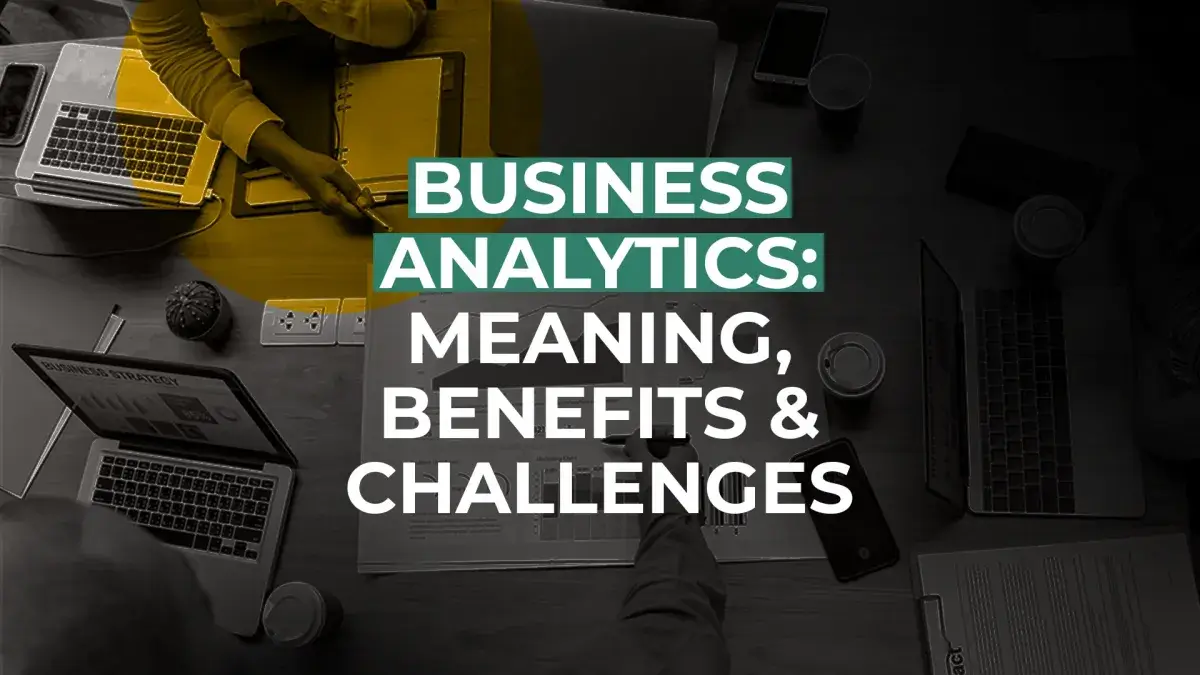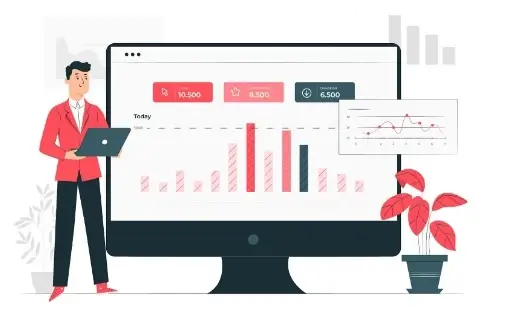What is Business Analytics and its Benefits

Here's What We've Covered!
Business Analytics is one of the most used buzzwords in the world of business, if not the most. With advancement of technology and collection of big data, businesses are now focusing on the analytical part as much as they focus on the marketing part. Naturally, business analysts are pretty much in demand these days.
But what does the term business analytics actually mean? How does it play a crucial role in conducting modern day businesses? Stay tuned till the end as we will be answering all these questions and explain how a certification course on business analytics can accelerate your career as business analyst.
Let’s begin by understanding the definition of Business Analytics and its evolution with time.
What is Business Analytics?
Business analytics (BA) is a process that combines data, technology and skillset to inspect a company’s performance in order to get an insight into the company’s health. Business analytics help businesses take data-driven decisions through statistical modeling and other quantitative methods.
Business analytics is not a 21st century phenomenon. Infact, the first usage of analytics in business was done way back in 1865 by Sir Henry Furnese, a banker by profession. Back then, the process was fully manual.
It was IBM who first introduced the hard disk drive that enabled businesses to store bulkload of data. Now as most of the processes are going online or getting automated, there’s a large set of data available for businesses to analyze. Thus, business analytics has become a big deal today.
Eager to start your journey as a Business Analyst? Enroll for IMS Proschool’s next month’s Business Analytics Batch
Different Types of Business Analytics Methods
Business analytics methods can vastly be segmented into four different types. Each one serves specific purposes with the common goal of improving overall profitability and productivity of a business. Here’s more about each type in detail.
Descriptive Analytics
Descriptive analytics, as the name suggests, is the long form of business analytics. It is done through analysis of historical data using two specific methods; data aggregation and data mining.
Unlike other forms of business analytics which are focused on the future, the primary goal of descriptive analytics is to find out what happened in the past and how a business could learn from past mistakes.
Predictive Analytics
An advanced data analytics method, predictive analytics aims to predict future trends and outcomes. Data mining plays a vital role in predictive analytics along with statistical modeling & machine learning.
Predictive analytics has come up as an effective growth driver that not only identifies key areas of growth but also helps businesses prevent frauds. Another type of predictive analytics uses deep learning to mimic human decision making processes.
Diagnostic Analytics
Diagnostic analytics is used to diagnose issues and to solve them eventually. If any adverse situation plays out in a business, diagnostic analytics examines the data to find out why it happens and prevents businesses from committing the same mistake.
Some key techniques of diagnostic analytics include data discovery, drill-down analysis, data mining and correlation analysis. It runs tests to determine the root cause of the problem.
Prescriptive Analytics
Prescriptive analytics emphasizes the future course of action needed for a business to prosper. The processes of prescriptive analytics is similar to that of predictive and descriptive analytics. However, the end goal is different as it aims to let algorithms create a decision-making pattern to eliminate existing problems.
How Business Analytics Fastracks Growth
Source: Freepik
Every decision taken in a business is to accommodate growth at an optimum pace. Like that, the end goal of business analytics integration in a business is to boost the growth. Here’s how business analytics helps businesses grow.
- Identifying business opportunities: Identifying new areas of business expansion is a key benefit of BA. Along with identifying threats and weaknesses, data analytics shows unexplored segments which can be future growth drivers.
- Increasing efficiency: Thanks to process automation and analysis, businesses can streamline all of their processes and monitor real-time progress and reports. Thus businesses can achieve optimal efficiency.
- Easing decision-making: Big data analysis helps businesses point out potential adverse situations that a business might face in the future. Thus it eases decision-making during rough rides.
- Reducing expenses: With help of business analytics, corporations can find out unnecessary expenses and cut those expenses down for good. Along with this, BA also identifies areas when cash infusion is needed.
In other words, business analytics help businesses in more than one way. It has become almost essential to survive in a competitive market space.
How to Become a Business Analyst?
Before we explain how to become a business analyst, let’s learn why become a business analyst in the first place. It’s a career path that brings new challenges and unlimited opportunity for professional growth. As a business analyst in India, you’ll always be earning well above the average wage, one of many perks of becoming a business analyst.
There is no specific route to take for pursuing a career in business analysis. However, there are some steps you can take to boost your chances of landing a business analyst job or internship.
Step 1: Get a Degree
Having a bachelor’s degree with specialization in economics, statistics, finance, computer science or similar fields is a big plus. And if you couple it with a master’s degree in business administration (MBA) then you’ll have credibility in your resume. However, these degrees are not mandatory unlike knowledge in the subject.
Step 2: Sharpen Your Skills
Business analysis is a skilled task where a professional must be accustomed to a number of tools and techniques. There’s no replacement for raw skills and knowledge. If you’re in your late 20’s and want to shift your career to business analytics, you should focus on sharpening your analytical skills.
Step 3: Enroll in a Course
The best possible way to build a new skill is by availing a potent course on it. IMS Proschool’s certification course on business analytics offers a holistic approach to learning the basics of business analytics. With IMS Proschool, you’ll not only learn advanced MS Excel & problem solving skills, but will also gather working knowledge on essential tools like Tableau, SQL, PowerBI.
Step 4: Begin with an Entry-level Role
Be it a simple work like cashier or a more complex one like business analysis, there’s no replacement for experience. If you aim for the sky, you have to start from the ground. Enter into any entry-level job that has an exposure to BA. That way, you will get valuable experience early in your career which will be crucial to progress your career.
In a Nutshell
When your business chooses data over random decisions, you are bound to have a better prospect at success. Business analytics is a key ingredient in modern day business expansion and smooth-running of business. It improves revenue, betters customer experience and uplifts overall efficiency.
If you’re interested in pursuing a career in business analytics, a certification course from IMS Proschool will give you an edge over your competitors. Connect with IMS Proschool now and kickstart your career as a business analyst.
Frequently asked questions
What does a business analyst do?
Business analysts investigate and analyze business performance with the help of data and statistics. These investigations result in unearthing of significant insights that benefit the business in the long run.
What is business analytics in simple words?
In simple words, business analytics reveals intriguing insights that make businesses smarter and financially stronger. With proper analysis, taking key decisions becomes faster, easier and statistically proven.
What skills do business analysts need?
Following listed are some essential skills to taste success as business analyst:
- Advanced knowledge of MS Excel and PowerBI
- Understanding business objectives
- Knowledge of database and SQL
- Creation and analysis of reports
Still have some questions you need an answers for?
Resent Post
>
Best Study Abroad Courses for Commerce Graduates
>
Emerging commerce career options in India (2026): From CA to Data Analyst
>
ACCA Opportunities You Didn’t Know About – Think Beyond Audit!
>
Which Courses After 12th Commerce With High Salary Are in Demand Worldwide?
>
How to Find ACCA Jobs Online After Qualifying: Real Portals, Tips & Career Guidance
Follow Us For All Updates!





